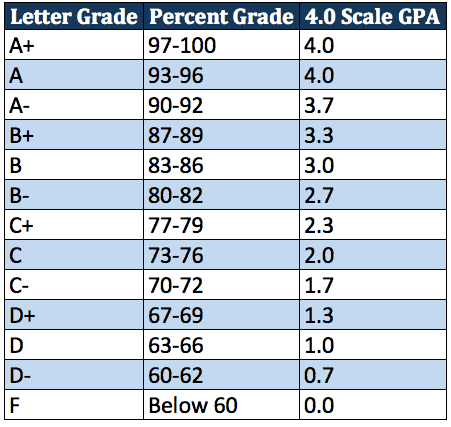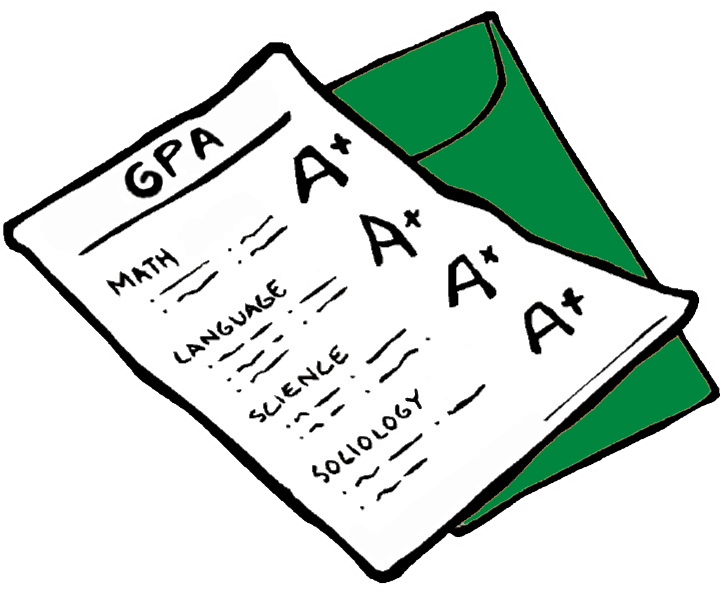Weighted vs. Unweighted GPA: What’s the Difference?
If you’re a high school student, chances are you’ve heard the term “GPA” before. It stands for “grade-point average,” and like its name suggests, it’s an average of how well you’re performing in all of your classes that count toward your GPA. High school students often worry about their GPA, hoping it will be high enough to get them into a good college. Many students plan their course schedule for the next year with GPA considerations in mind. If you’ve learned a bit about GPA in high school and have heard terms like “weighted” and “unweighted” GPA thrown around, perhaps you wonder what those terms mean. This article aims to answer the question: Weighted vs. unweighted GPA—what’s the difference? We’ll also examine whether colleges look at weighted GPA or unweighted GPA. Let’s go!
Unweighted GPA
First, let’s aim to understand unweighted GPA. Unweighted GPA is how GPA is traditionally calculated. It’s likely how your college GPA will be calculated. It doesn’t take the difficulty level of different courses into account. Weighted GPA is measured on a scale of 0 to 4.0. An A will be worth 4.0, an A- slightly less, and so on. If your grades are given out of 100, then GPA can be calculated using proportions as well. The table below shows how a letter grade or a score out of 100 might be converted into a GPA.

Things to consider if your high school uses unweighted GPA
If your high school uses an unweighted GPA system, there are some things you’ll want to consider as you assess your chances of getting into college.
The first thing to know is that college admissions officers are well aware of the two different GPA calculation systems, and they will make a point to review your high school course curriculum to see what type of classes you took in high school and how well you did at them. They’ll also take your class rank into account in context of how many seniors there are in your graduating class. Being ranked 1st out of only 100 students, for example, might not represent as great an achievement as being 3rd out of 1,000 students. It’s all relative.
So don’t assume that having a 4.0 unweighted GPA in regular will somehow look “perfect” to the college admissions officers. And don’t assume that if you’ve got a 3.7 in advanced classes you’ll be rejected in favor of a student who has a 3.9 in regular classes.
When they interpret the data about your high school class choices and your performance in those classes, college admissions officers are certain to seek out context in the interest of seeing the big picture.
Weighted GPA
Weighted GPA, like its name suggests, assigns different WEIGHTS to certain courses. AP, advanced, or honors courses may be assigned a different weight. For example, in my high school, we used a weighted system, with regular courses graded on a 4.0 scale, Pre-AP courses graded on a 5.0 scale, and AP courses graded on a 6.0 scale. This means that students who do well in challenging courses will have higher GPAs than students who do well in regular courses.
Things to consider if your high school uses a weighted GPA system
First, understand that different schools might have different GPA weighting systems. Some will make the highest weight worth 5.0, while others might make the highest weight worth 6.0.
If your school uses a weighted GPA system, the first thing you should do is understand how that system works.
Second, don’t assume that having a 4.0 under a weighted GPA system will make you look “perfect” to the college admissions committee. Again, they will be sure to note the type of GPA system your high school uses, and they’ll also seek more detailed information about the courses you took in high school and their difficulty level in the interest of forming a context-based picture of your academic profile.
Remember that some courses may count toward your GPA and other courses may not count toward your GPA. This fact can lead to controversy among students. For example, perhaps one school’s policy is NOT to count band on students’ GPA, allowing a band student enrolled in all 6.0 classes to earn a GPA that looks higher than a student earning the same grades in advanced classes but who’s also taking theatre, which, under the school in question, counts on students’ GPAs. The effect of this scenario would be that two students with equal grades in academic classes of the same difficulty level might have different GPAs due to the way GPA works for extracurricular courses. Needless to say, GPA is not a perfect measure!
So while you may want to strategize in order to earn the highest GPA (and highest class rank) possible, don’t obsess to much over your GPA and class rank. So long as you’re challenging yourself in high school, immersing youself in MEANINGFUL extracurricular activities, and working to cultivate passions (and developing the verbal skills necessary to COMMUNICATE those passions) you’ll have a great shot at getting into college. Admissions committees are certain to seek more than surface-level details while assessing your college prospects.
Work hard, challenge yourself, find your passion, learn how to communicate that passion, and BE AUTHENTIC!
Which GPA do colleges look at?
In general, colleges gain more information from weighted GPAs than unweighted GPAs, but colleges look at both of them and consider both of them as part of a much broader picture. People making the decisions on whether or admit you or reject you to their school are aware that different students take classes of varying difficulty levels, so they are sure to view your GPA in conjunction with the list of courses you’ve taken, factoring in your class rank, and so on. College admissions is usually a holistic process, so just because you have a higher or lower GPA than another person doesn’t mean you’ll be accepted or rejected accordingly. Students at schools that use weighted GPAs and unweighted GPAs both have a fair shot at getting into college.
Bonus: When you’re in college…
Your GPA will definitely be calculated in an unweighted, 4.0 fashion. Get the highest GPA possible if you’re interested in graduate school, and DEFINITELY get the highest GPA possible in classes in your major field of study! Graduate awards, teaching assistantships, and fellowships might have GPA requirements, and the higher your college GPA, the better your chances of admission to graduate school are.
* * *
That’s it! For SAT and ACT prep tips, as well as more college admissions advice, check out the rest of our blog. Looking for 1-on-1 ACT or SAT prep tutoring? Want to join an SAT or ACT group class? Contact us today!
